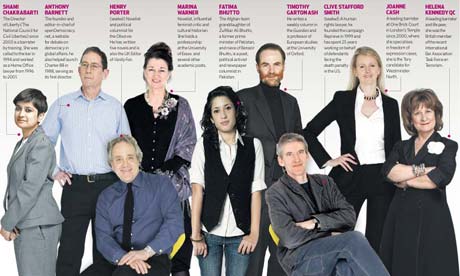In the week that ex-MI5 head Stella Rimington warned that Britain is becoming a police state, we offer one ray of light: a coalition from left and right determined to uphold our hard-won civil liberties and rights. Robert McCrum reports From left to right: Shami Chakrabarti, Anthony Barnett, Henry Porter, Marina Warner, Fatima Bhutto, Timothy Garton Ash, Clive Stafford Smith, Joanne Cash and Helena Kennedy QC Photograph: Katherine Rose, Andy Hall and Alixandra Fazzini/Observer What do you see? A thriller writer, a Tory candidate and a rebel peer? Three middle-aged men? A well-known academic and a Pakistani journalist scurrilously said to be dating George Clooney? The front line in the peoples' ancient war with the power of the state? The defence of our island freedoms can seem as paradoxical as those freedoms themselves. Consider the record. Here is a country with no written constitution, one that has always believed passionately in the rights of the individual, a society whose first assertion of the citizen's liberties, Magna Carta, was negotiated in a field outside Windsor and recorded in Latin. More perplexing still, our parliamentary democracy is famous for an act of regicide but still pays allegiance to the crown. Our Bill of Rights followed a foreign invasion led by a Dutchman. Today, one of our best protections, the European Convention on Human Rights, is run from Strasbourg. Defending this heritage is what separates a democracy from a tyranny, but the champions of our liberty hardly fit a mould either. Wat Tyler? A retired military man and poll-tax rebel. John Milton? A blind poet and author of the classic defence of press freedom in the English language, Areopagitica. John Wilkes? A notorious rake and author of the pornographic "Essay on Woman". Tom Paine? The author of those 18th-century bestsellers Common Sense and The Rights of Man was a drunk, a failed tobacconist and a designer of corsets. Freedom has many expressions, but it is, finally, indivisible. Today, a wide spectrum of citizens from Stella Rimington, ex-head of MI5, to the columnist and Oxford academic, Timothy Garton Ash, accuses the government of exploiting fear of terrorism to infringe our civil liberties. in what Garton Ash calls "death by a thousand cuts", a silent but deadly accumulation of police powers. What animates these new libertarians is a passionate belief that the equilibrium between individual and state has become dangerously skewed, as in the increase of detention time limits to 42 days. Rimington says the war on terror risks making people "live in fear and under a police state". At the heart of the photograph above are two men of sharply contrasting experience who have united to launch the Convention on Modern Liberty out of a shared distrust of what they see as New Labour's sinister agenda. Henry Porter is a journalist, a thriller writer and London editor of Vanity Fair. He has long campaigned in the Observer against the rise of the secret state under New Labour and the government's assault on our rights and freedoms, the issue on which David Davis resigned his Commons seat last June. Anthony Barnett has rich experience of fighting injustice. He was a founder member of Charter 88, a group that campaigned for a democratic, written constitution. He says: "We are now faced by some kind of a system crisis. There's a generation that's grown up under New Labour which has known nothing else. We have to address people in their twenties.' Barnett had been following Henry Porter's columns in the Observer when they met at the funeral of Anthony Sampson, author of The Anatomy of Britain. At the graveside, they decided they had to do something and needed a media partner. There was only one place to go. Porter volunteered to approach the Guardian Media Group, which owns the Observer, while Barnett began to mobilise his Charter 88 network. If Barnett provided the rocket fuel, then Porter is the self-guided missile. He has marshalled a persuasive attack on CCTV surveillance, the government's DNA database and its ID card legislation. For Porter, the state is the enemy, a conventional Tory position. But left and right labels aren't helpful here because New Labour's assault on civil liberties has also galvanised the old left. So the Convention on Modern Liberty unites an informal opposition to New Labour in a big, baggy tent that includes Amnesty International, the Countryside Alliance, English Pen, History Today, Human Rights Watch, Private Eye, Red Pepper and the TUC. Underlying all this is a passionate defence of the English tradition of common law, uniting the likes of Joanne Cash, the media barrister specialising in libel and privacy, with New Labour rebel Helena Kennedy. Cash, a prospective Tory candidate for John Stuart Mill's old seat of Westminster, says she is motivated by the threats to freedom of expression. Kennedy, who was a chair of Charter 88, has been worrying about our laws for a decade and more. In 2004, she published Just Law, a polemical defence of our civil liberties, and brings many of these arguments to the convention: "You must defend the foundations," she says. "English common law, in which I passionately believe, is based on a healthy scepticism about the exercise of power." Thanks to Barnett's international savvy, the convention has avoided Little Englander provincialism, securing the support of Fatima Bhutto, an outspoken critic of Pakistan's state corruption. Another lawyer, Clive Stafford Smith, comes to the convention from a global perspective. He has led the field in securing the release of British detainees in Guantánamo Bay. Half-American by birth, he can see the weaknesses of the English position and comments that, compared with Americans, "the English have never really internalised the notion of free speech". He salutes Porter's leadership and hopes the campaign will adopt a positive, possibly more American, spirit of optimism. "The left has a tendency to complain," he says. "We should at least focus our energies on a new Bill of Rights." There is a profound cultural dimension too, involving questions of education, women's rights and pornography. These have drawn Marina Warner, one of the most subtle analysts of contemporary cultural transactions, into Porter's tent. She will lead a convention session on "Love and Liberty". She says: "I always welcome it when political gatherings place anything cultural at the heart of their thinking. Justice and equality need to be shaped philosophically before they can take a precise form. It's a brilliant idea to think about love and liberty. Let's hear it for co-operative species!" Barnett says the Convention on Modern Liberty has studied the Obama campaign, and is "inspired by, but not modelled on, it." The convention will deploy video links and internet communications to conduct a simultaneous programme of consciousness-raising on 28 February. Porter resists the suggestion that it's just a giant, middle-class seminar. "It's a call to action," he says, "a call to arms." How long do we have before it's too late? "Two years." Barnett has a less urgent perspective, based on fighting old battles, but still talks of a crisis. "This feels very different from Charter 88. We're looking at a process that will take five to 10 years and it will be led by people in their twenties. A new generation must drive this convention." His inspiration? The Levellers.

Monday, 23 February 2009
Posted by
Britannia Radio
at
14:49
![]()






















